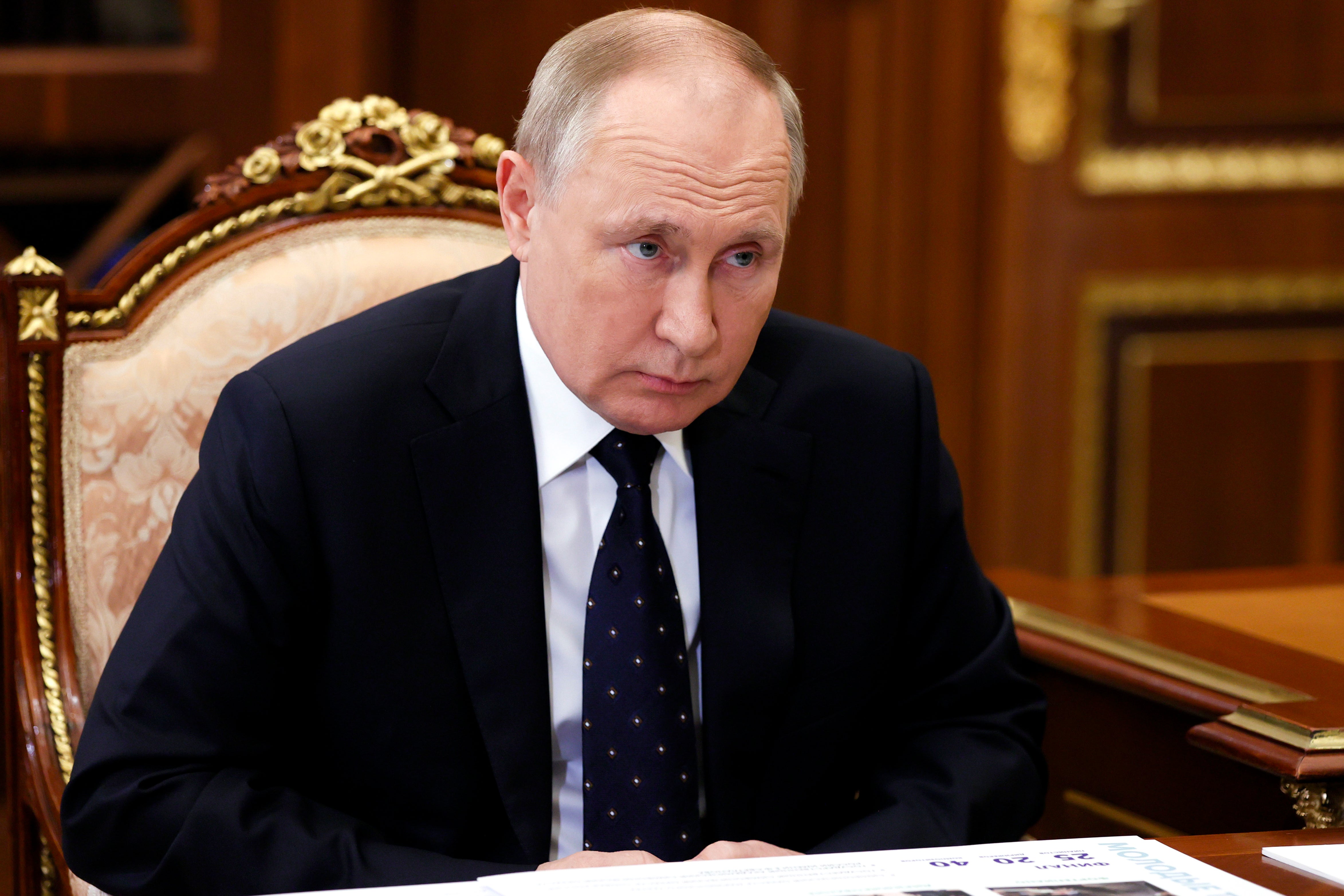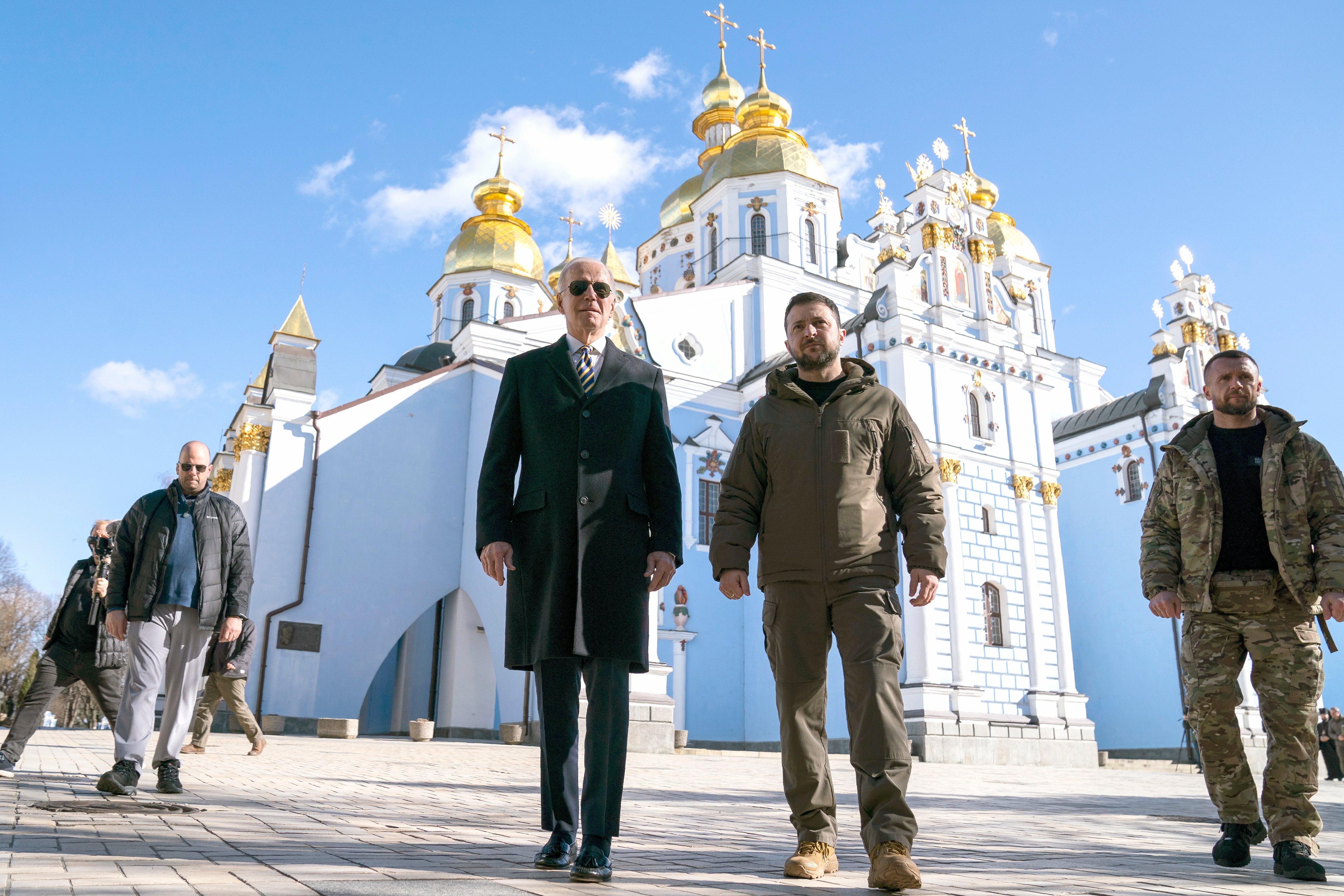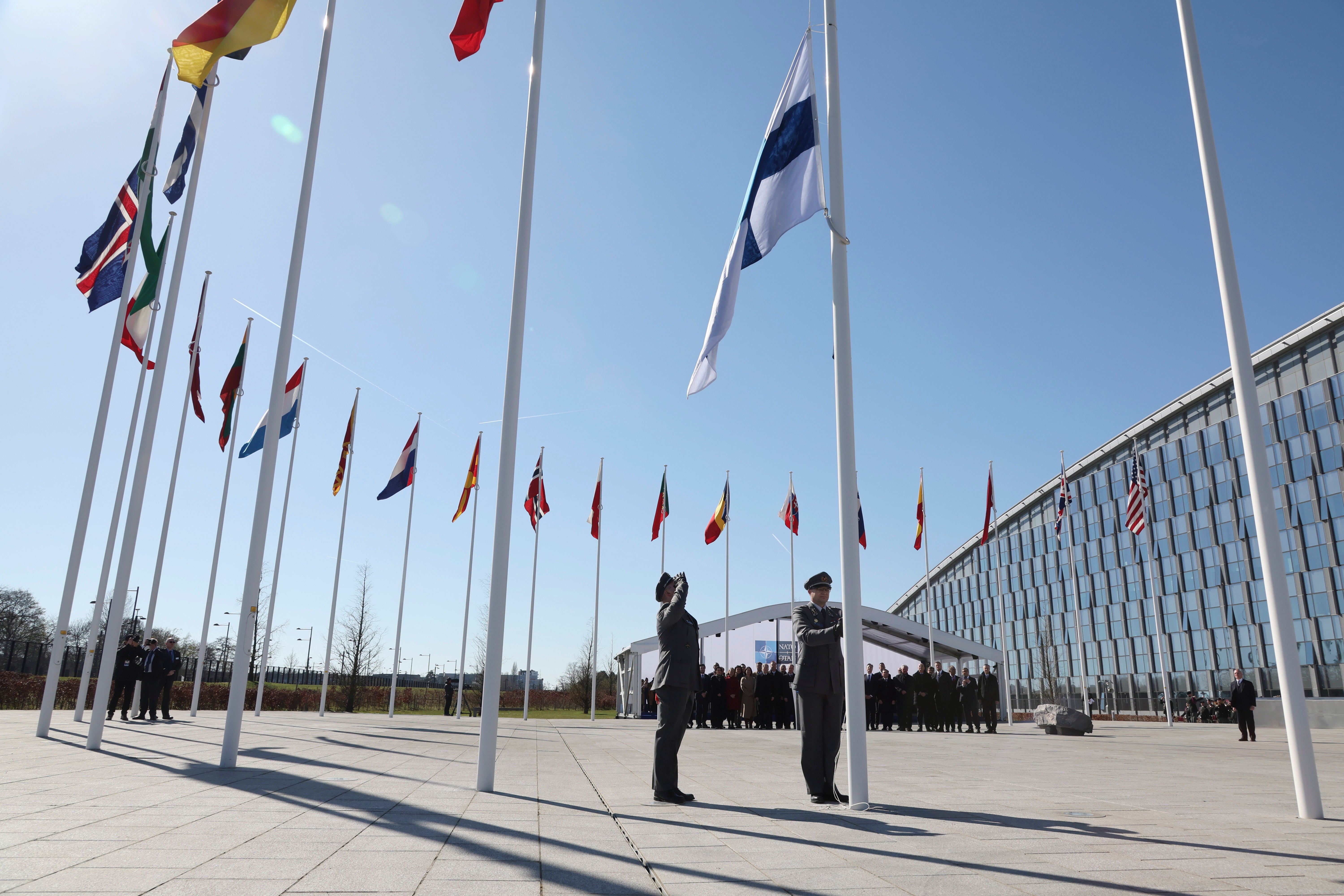Why does Russia want to block Ukraine from joining Nato?
Vladimir Putin vehemently opposed to neighbouring state signing up to Western military alliance
Tensions along Russia’s border with Ukraine finally erupted into open warfare on 24 February 2022 as Vladimir Putin announced a “special military operation” in the eastern regions of the neighbouring state, confirming fears that had lingered since the preceding December that he was amassing troops intent on an invasion.
The Kremlin leader said he believed that Russia had to take decisive action to extinguish a threat to its national security and that Moscow planned to carry out the “demilitarisation and de-Nazification” of Ukraine by toppling its leadership, also promising to put an end to eight years of war in which government forces have been battling pro-Russian separatists in the eastern Donbas.
In the 16 months of fighting that have followed, the Russian military has bombarded cities like Kharkiv and Mariupol with intense shelling campaigns in tactics reminiscent of those previously deployed in Chechnya and Syria and become bogged down in gruelling combat in southeastern Bakhmut while millions of people have fled for neighbouring Poland, Hungary, Slovakia, Romania and Moldova.
Ukraine’s president Volodymyr Zelensky meanwhile continues to lead by example from Kyiv, as he has done throughout the war, tirelessly rallying the international community for support, as his people stage a courageous fightback against Russia’s armed forces with the help of generous foreign military aid.
US president Joe Biden, UK prime minister Rishi Sunak and French president Emmanuel Macron have joined other global powers in condemning Moscow’s “unprovoked and unjustified” attack and promised to hold it “accountable” but have not joined the fight militarily because Ukraine is not currently a member of the North Atlantic Treaty Organisation (Nato) , whose members are honour-bound to come to the defence of any of its fellows under attack.
Before the war, Mr Putin had previously denied having any intention of invading the neighbouring state and had presented the West with a series of demands, including an end to the eastern expansion of Nato membership to ex-Soviet states and the curtailment of US and alliance military activity on Russia’s doorstep.
The issue of Ukraine’s exclusion from Nato has been a long-standing obsession for Mr Putin, who bitterly remembers the aftermath of the collapse of the Soviet Union under his predecessor Boris Yeltsin in the 1990s as “a decade of humiliation” in which Bill Clinton’s US “imposed its vision of order on Europe (including in Kosovo in 1999) while the Russians could do nothing but stand by and watch”, according to diplomatic relations expert James Goldgeier.
Mr Yeltsin did write to Mr Clinton in September 1993 expressing similar concerns, however, saying: “We understand, of course, that any possible integration of East European countries into Nato will not automatically lead to the alliance somehow turning against Russia but it is important to take into account how our public opinion might react to that step.”
To address those anxieties, the Nato-Russia Founding Act was signed in 1997, a political agreement explicitly stating that: “Nato and Russia do not consider each other as adversaries.”
The formation of the Nato-Russia Council followed in 2002.
But Mr Putin is nevertheless said to begrudge what he regards as the alliance’s gradual sprawl eastwards, which saw ex-Soviet satellites Czech Republic, Hungary and Poland join in 1999, followed by Bulgaria, Estonia, Latvia, Lithuania, Romania, Slovakia and Slovenia in 2004.

He chooses to interpret the recruitment of these nations as the US breaking a promise allegedly made by its then-secretary of state James Baker to Mikhail Gorbachev during a visit to Moscow in February 1990 to discuss German reunification following the fall of the Berlin Wall.
“There would be no extension of Nato’s jurisdiction for forces of Nato one inch to the east,” Mr Baker is supposed to have pledged to Mr Gorbachev, according to Russian officials, although the quote is heavily disputed and the latter denied the topic was ever discussed in an October 2014 interview with the Kommersant newspaper.
Mr Putin has nurtured his grievance ever since regardless, no doubt keen to foster anti-Western sentiment at home and consolidate his powerbase, and has strongly opposed other Eastern European states joining the alliance.
“It is obvious that Nato expansion does not have any relation with the modernisation of the alliance itself or with ensuring security in Europe,” he said at the Munich Security Conference in 2007. “On the contrary, it represents a serious provocation that reduces the level of mutual trust.”
The following April, attending a Nato summit in Bucharest at which the alliance pledged future membership for Ukraine and Georgia (without specifying a roadmap and overlooking the reservations of France and Germany), he was even more emphatic: “No Russian leader could stand idly by in the face of steps toward Nato membership for Ukraine. That would be a hostile act toward Russia.”
Four months later, Mr Putin invaded Georgia, destroying the country’s armed forces, occupying two autonomous regions and humiliating a president, Mikheil Saakashvili, who had openly courted Nato membership, actions that brought fresh international condemnation.
For its part, Nato’s official stance remains that “a sovereign, independent and stable Ukraine, firmly committed to democracy and the rule of law, is key to Euro-Atlantic security”.
It points out that its associations with the country date back to the disintegration of the USSR and that cooperation has had to be intensified in light of Russian regional aggression in 2014, when it annexed the Crimea Peninsula and supported the separatist insurgencies in DPR and LPR.

For the US, Ukraine’s path to Nato membership is less clear cut.
Secretary of state Antony Blinken told the Senate Foreign Relations Committee as recently as 8 June 2021 that “we support Ukraine membership in Nato” but his deputy, Wendy Sherman, was cagier when she addressed the issue in January, saying only: “Together, the United States and our Nato allies made clear we will not slam the door shut on Nato’s open door policy – a policy that has always been central to the Nato alliance.”
Mr Biden, the former top Democrat and later chair of that same committee, had previously believed that turning former Soviet republics into Nato allies marked “the beginning of another 50 years of peace” but has since pivoted to scepticism about US involvement in far-flung “Forever Wars”, hence the hurried withdrawal from Afghanistan after 20 years of peace-keeping occupation.
He is also known to be determined to see political and judicial corruption stamped out in Ukraine and reluctant to further provoke the Russian bear, having lived most of his life through the era of mutually-assured destruction, especially given that the security threat posed by China is a current priority that cannot be ignored.
Without Ukraine being part of the alliance, the US and Nato are under no treaty obligation to come to its aid, whereas those security assurances are extended to nearby Baltic states like Estonia, Latvia and Lithuania since they signed up with the 2004 induction.
All three could become potential future targets for Russian annexation, incidentally, if the current situation leaves Mr Putin feeling emboldened, which was the precisely the motivation that led Finland to join the alliance on 4 April 2023. Sweden could soon follow if opposition from Turkey can be overcome.

That said, Mr Biden’s sabre-rattling rhetoric strongly suggests he is prepared to intervene in some form, even if that does not mean American boots on the ground.
The US provided has provided $41.3bn to Ukraine in defensive military aid since the war began, according to the State Department, and shows no signs of ending its outreach.
If it were to offer more direct defensive resources, the US would be in a position to provide Ukraine with a broad range of assistance free of charge, from air defence, anti-tank and anti-ship systems, electronic warfare and cyber defence systems to supplies of small arms and artillery ammunition.
The announcement in July that the US would begin supplying Ukraine with cluster bombs for “very careful” use on its own territory against Russian forces was seen in some quarters as a significant escalation, in light of the fact that 100 nations had signed a 2008 treaty in Oslo, Norway, opposing the use of such dangerous weapons (although neither the US nor Ukraine, nor Russia, were signatories).
In making the annoucement, US undersecretary of defence for policy Colin Kohl did admit that the US had previously criticised Russia’s use of cluster munitions because they done so indiscriminately, and with older, less reliable systems that cause more civilian casualties.
But he insisted Kyiv had assured Washington that they would not use the cluster rounds in civilian areas or urban environments and had also commited to recording where they were used to aid in future post-war cleanup efforts.
Ahead of the latest Nato gathering in Vilnius, Lithuania, in July, the Kremlin reiterated its opposition to Ukraine joining Nato, warning that such an eventuality would have “very negative” consequences for Europe’s security architecture and that it would be met with a “harsh response”.
Join our commenting forum
Join thought-provoking conversations, follow other Independent readers and see their replies
Comments


Bookmark popover
Removed from bookmarks